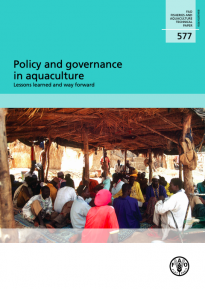Supportive Policy Environment for Mortality During Grow Out
In general terms, policy which promotes best aquaculture practices will promote the adoption of good husbandry and grow out practices which will prevent or reduce mortality related loss and waste.
Policy Guidance for Best Management Practices
The Code of Conduct for Responsible Fisheries (CCRF) provides general policy guidance for best management practices (see: Article 9.4 - Responsible aquaculture at the production level):
- 9.4.1 - States should promote responsible aquaculture practices in support of rural communities, producer organisations and fish farmers.
9.4.2 - States should promote active participation of fish farmers and their communities in the development of responsible aquaculture management practices.
9.4.3 - States should promote efforts which improve selection and use of appropriate feeds, feed additives and fertilisers, including manures.
9.4.4 - States should promote effective farm and fish health management practices favouring hygienic measures and vaccines. Safe, effective and minimal use of therapeutants, hormones and drugs, antibiotics and other disease control chemicals should be ensured.
9.4.5 - States should regulate the use of chemical inputs in aquaculture which are hazardous to human health and the environment.
9.4.6 -States should require that the disposal of wastes such as offal, sludge, dead or diseased fish, excess veterinary drugs and other hazardous chemical inputs does not constitute a hazard to human health and the environment.
9.4.7 - States should ensure the food safety of aquaculture products and promote efforts which maintain product quality and improve their value through particular care before and during harvesting and on-site processing and in storage and transport of the products.
Uptake of best practice is influenced by governance. According to FAO publication Policy and Governance in Aquaculture, governance will become increasingly important as aquaculture expands in an environment of deteriorating ecosystems, vocal and well-funded NGOs, climate change, consumer concerns over food safety and the environment, and internationalisation of regulations due to import requirements.
Applying a Broader Management Approach
Applying a Broader Management Approach
Applying a broader management approach to aquaculture — one that integrates the industry into coastal zone management and is ecosystem-based — is seen as critical for the industry to address the persistent challenges. For example, disease is a major limiting factor in most aquaculture production. It is costly, not only due to reduced growth, increased mortality in stocks, and the associated additional resource use, but also due to the costs associated with treatment, control, and management. Certain pathogens, such as those listed by the World Organisation for Animal Health (OIE) can also have implications on trade, reducing the ability to export animals and in some cases commodities to other areas or countries free of those pathogens. Pathogens associated with aquaculture may also pose a risk to wild aquatic animal stocks, which can be detrimental to both the environment and the industry’s reputation. Within this context, understanding the key drivers and risk factors for disease, which largely fall under the headings of: contact network, host susceptibility, environmental drivers, husbandry practices, and other stressors.
Key Publications
Policy and governance in aquaculture Effective governance of modern aquaculture must reconcile ecological and human well-being so that the industry is sustainable. Without effective governance, there will be misallocation of resources, stagnation of the industry, and irreversible environmental damage. | |
Best Practices For Aquaculture Management Syntheses of key scientific and technical guidelines to help regulators and industry practitioners address three systemic challenges facing the aquaculture industry: spatial conflicts with others, exceeding carrying capacity of waterbodies and disease amplification. |
More Resources
More Resources
31 October 2023
01 January 2018













